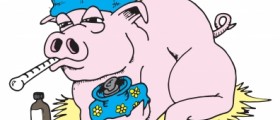
Introduction
Flu may be a very common infectious disease but it is certainly not pleasant, and it is even more frustrating for babies and their parents. Many parents are extremely worried about flu, especially considering that it is not a typical disease for babies and that its complications can be quite serious.
Flu or influenza is a common infection that involves mainly the upper respiratory tract. It is particularly common during cold seasons and among people who spend a lot of time in closed environment. It is a viral disease, caused by the influenza virus. This virus spreads from person to person through direct or indirect contact. The disease lasts from five to fourteen days, depending on several factors. It is best if treated at home, with plenty of rest and fluids.
Flu in babies
In babies, it may not be very easy to determine whether they have flu or something else. Sometimes a baby with flu will only look lethargic and have poor appetite. If the baby does have the typical flu symptoms, he or she will have a high fever, typically 101 degrees Fahrenheit or higher, chills, fatigue, runny nose, sneezing, dry cough, sore throat and swollen glands. The baby will be less active as usual, may sleep more than usual and eat less than usual.
Babies who have flu are generally more likely to require hospital treatment than older children or adults. This is because the virus strikes harder in babies and they feel the symptoms stronger than older ones.
Babies may get the flu virus from a person who is already sick and coughs or sneezes around the baby. The baby inhales the airborne droplets of saliva and contracts the virus.
Treatment for flu in babies
Babies need a lot of care when they are down with flu. They also need to be closely monitored for signs of potential complications. The best treatment for this infectious disease is to take a lot of rest and to drink plenty of fluids. It is recommended to consult a pediatrician as to what kind of fluids and foods will help the baby get better soon.
Most drugs that adults use for flu are not suitable for children, but there are those that are that that can be prescribed by a pediatrician. Aspirin must never be given to a child. If the fever is high, lukewarm baths can help reduce the temperature.
It is advised to see a doctor if the baby is younger than three months and has a fever of 100.4 degrees or higher. The same is required for babies between three and six months of age with a fever of 101 degrees F or higher and for six-months old with a fever of 103 degrees F or higher. It is also important to see a doctor if the fever lasts for more than three days and if the cough persists for more than a week. Earache, wheezing and dehydration should also be reported to a pediatrician.

















Your thoughts on this
Loading...